The Chief Operating Officer (COO) is a key figure in any organization, responsible for overseeing the day-to-day administrative and operational functions. This role is central to ensuring that the business runs efficiently and effectively, aligning various departments towards common business goals.
Skills required for a COO include strategic planning, leadership, and financial acumen, as well as the ability to manage people and resources. Assessing these skills involves looking at past leadership experiences, the ability to drive operational success, and how well they understand and can manage company finances.
Candidates can write these abilities in their resumes, but you can’t verify them without on-the-job COO skill tests.
In this post, we will explore 7 essential COO skills, 7 secondary skills and how to assess them so you can make informed hiring decisions.
Table of contents
7 fundamental COO skills and traits
The best skills for COOs include Strategic Planning, Financial Acumen, Operations Management, Change Management, Risk Management, Data Analysis and Stakeholder Communication.
Let’s dive into the details by examining the 7 essential skills of a COO.
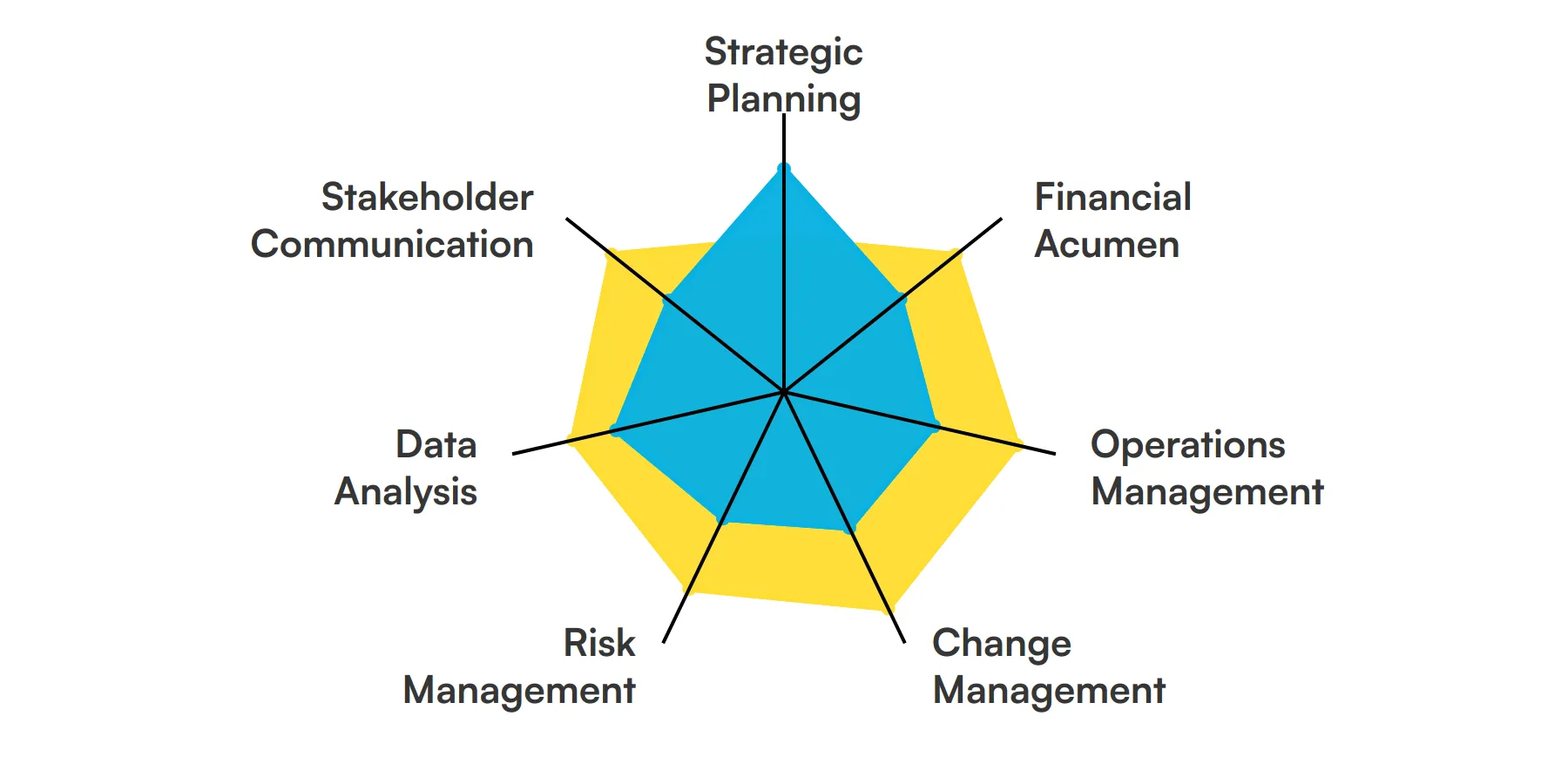
Strategic Planning
Strategic planning is key for a COO to align the company's operational activities with its long-term goals. This skill involves setting clear objectives, analyzing competitive environments, and implementing effective strategies to drive sustainable growth.
For more insights, check out our guide to writing a COO Job Description.
Financial Acumen
A COO must possess strong financial acumen to oversee the organization's fiscal activities. This includes budget management, financial forecasting, and analyzing financial reports to make informed decisions that will impact the company's profitability and cost-efficiency.
Operations Management
Effective operations management is crucial for a COO to ensure that all business processes are efficient and scalable. This involves optimizing supply chain logistics, improving production workflows, and maintaining quality control to meet customer demands.
Change Management
Change management involves guiding and implementing processes and systems changes within the organization. A COO uses this skill to ensure smooth transitions and to minimize disruptions, thereby maintaining or improving operational efficiency during periods of change.
Risk Management
Risk management is essential for a COO to identify, analyze, and mitigate risks that could impact the organization. This skill helps in developing strategies to handle potential threats and ensures the company's resilience and sustainability.
Data Analysis
Data analysis enables a COO to make data-driven decisions that enhance operational effectiveness. By interpreting complex data sets, a COO can identify trends, forecast outcomes, and optimize processes to improve overall business performance.
Check out our guide for a comprehensive list of interview questions.
Stakeholder Communication
Effective communication with stakeholders is key for a COO to ensure all parties are aligned with the company's objectives. This skill involves clearly conveying strategies, negotiating with partners, and maintaining strong relationships with investors, suppliers, and customers.
7 secondary COO skills and traits
The best skills for COOs include Project Management, Human Resources, Technology Integration, Regulatory Compliance, Innovation Management, Sustainability Practices and Crisis Management.
Let’s dive into the details by examining the 7 secondary skills of a COO.
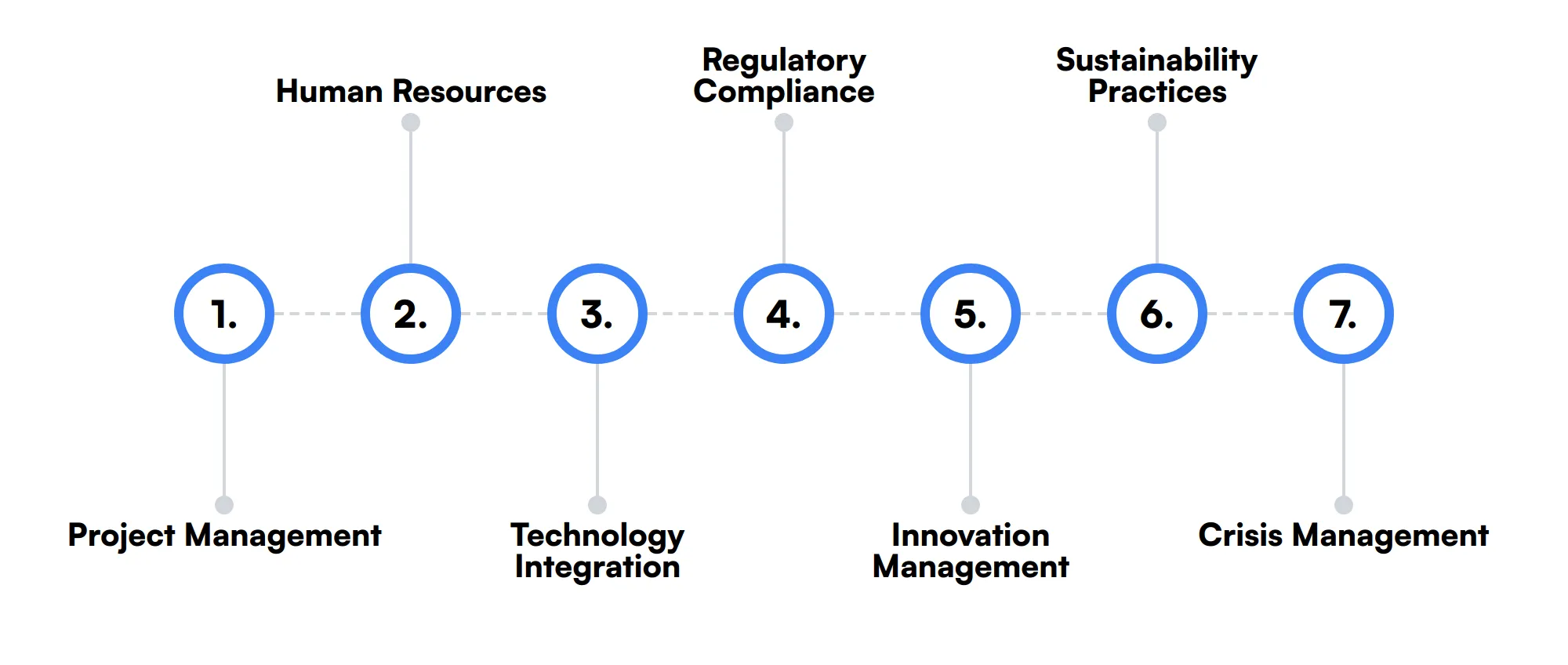
Project Management
Project management involves planning, executing, and finalizing projects according to strict deadlines and within budget. This includes acquiring resources and coordinating the efforts of team members and third-party contractors or consultants.
Human Resources
Understanding HR processes is important for a COO to manage the workforce effectively. This includes knowledge of recruitment strategies, employee development, and retention practices to ensure the organization has the talent necessary to achieve its goals.
Technology Integration
A COO must be adept at integrating technology to streamline operations and increase productivity. This includes implementing new systems and software, and ensuring that technology adoption aligns with business objectives.
Regulatory Compliance
Ensuring compliance with laws and regulations is critical for a COO to avoid legal issues and maintain the company's integrity. This skill involves staying updated on industry-specific regulations and implementing policies that comply with these laws.
Innovation Management
Innovation management involves fostering a culture of innovation within the organization. A COO encourages creative problem solving and the development of new products or services that can provide a competitive edge.
Sustainability Practices
Implementing sustainability practices is increasingly important for COOs to address environmental concerns and enhance the company's public image. This includes adopting eco-friendly processes and promoting sustainable business practices.
Crisis Management
Crisis management skills are crucial for a COO to effectively handle unexpected events that threaten the organization. This involves quick thinking, calm decision-making, and strategic planning to navigate through crises.
How to assess COO skills and traits
Assessing the skills and traits of a Chief Operating Officer (COO) is a nuanced process that goes beyond reviewing resumes and conducting interviews. The role of a COO involves a dynamic blend of strategic oversight and practical execution, making it essential to evaluate their proficiency across several key areas.
The skills required for a successful COO include Strategic Planning, Financial Acumen, Operations Management, Change Management, Risk Management, Data Analysis, and Stakeholder Communication. Each of these areas contributes to the overall effectiveness of a COO in driving organizational success.
To accurately assess these skills, companies are increasingly turning to specialized assessments that provide a deeper insight into a candidate's capabilities and potential fit. Adaface assessments offer a tailored approach to evaluating the complex skill set of COOs, ensuring that candidates can not only meet but exceed the demands of the role. By integrating these assessments into the hiring process, companies have reported a 2x improvement in the quality of their hires and a significant reduction in screening time.
Let’s look at how to assess COO skills with these 6 talent assessments.
Data Interpretation Assessment Test
Data Interpretation Assessment Test evaluates a candidate's ability to analyze complex data, extract meaningful insights, and structure observations from multiple data sources like tables, charts, and graphs.
The test assesses skills in reading data, drawing inferences, interpreting graphs, analyzing charts and tables, and data visualization. Candidates must navigate through various data formats and derive actionable insights.
Successful candidates demonstrate proficiency in handling diverse data sets and visualizing data effectively to support decision-making processes.
Financial Accounting Online Test
Financial Accounting Online Test uses scenario-based multiple-choice questions to evaluate a candidate's knowledge and skills related to financial statements and reporting, accounting principles, and financial analysis.
The test covers financial statements, accounting principles, double-entry bookkeeping, assets and liabilities, income and expense recognition, and financial ratios. Candidates are evaluated on their ability to interpret and analyze financial data and apply accounting standards.
High-scoring candidates show a strong understanding of financial analysis, cash flow statements, and the ability to communicate financial information effectively to stakeholders.
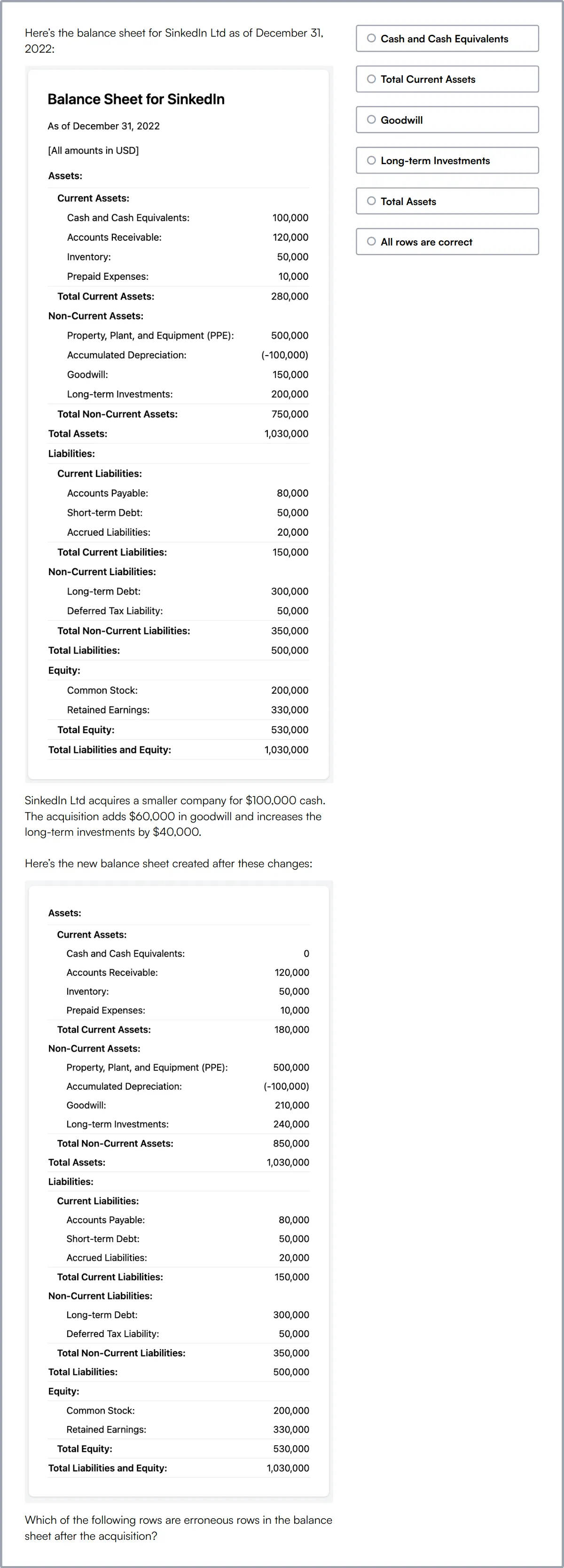
Project Management Test
Project Management Test assesses a candidate's ability to plan projects from conception to implementation, map timelines, assess risks, allocate budgets, and manage stakeholders.
The test evaluates skills in cost and budget estimation, situational judgement, designing a project plan, resolving issues and handling changes, and stakeholder management. Candidates must demonstrate their ability to manage and control resources and prioritize tasks in real-time.
Successful candidates exhibit a strong understanding of both agile and traditional project management methodologies, including risk analysis and creating and analyzing project reports.
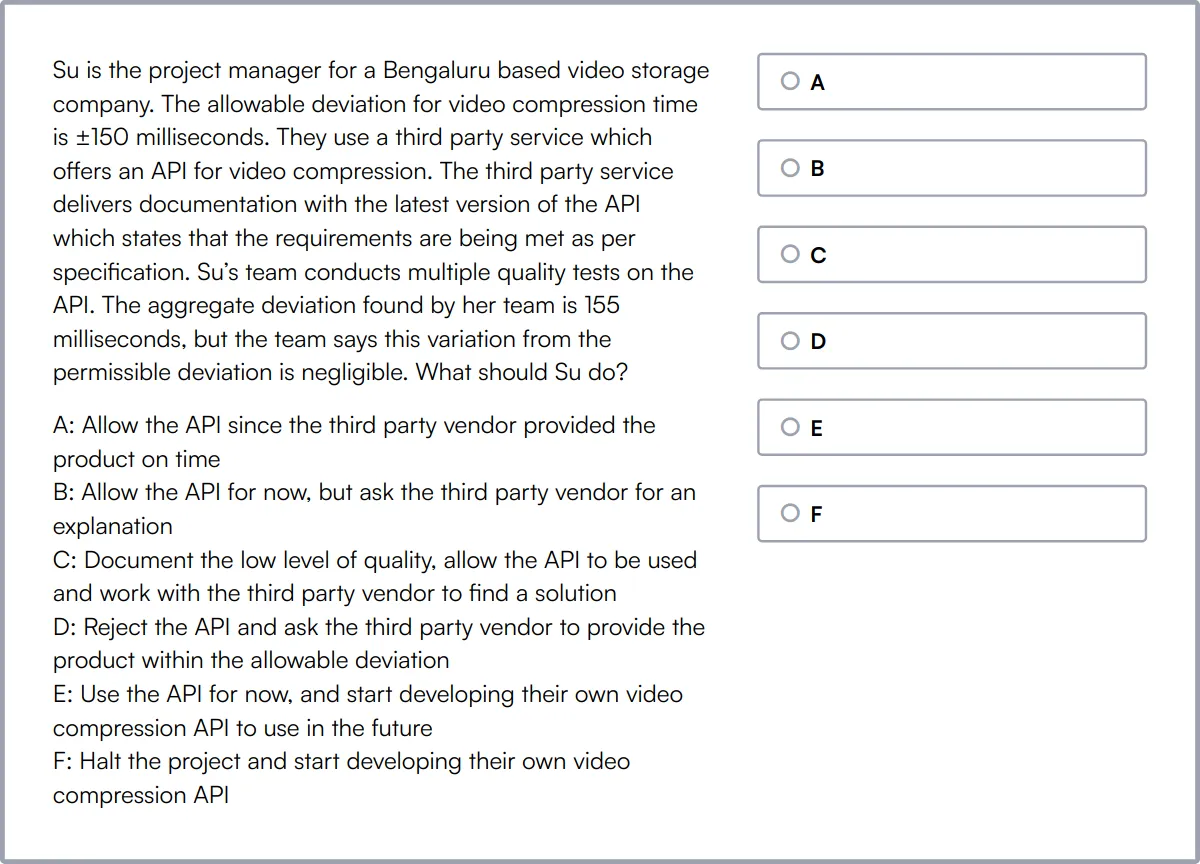
Scrum Master Test
Scrum Master Test evaluates a candidate's knowledge and understanding of the Scrum framework, agile principles, and the role of a Scrum Master.
The test covers sprint planning, product backlog management, user stories, iteration review, daily stand-up meetings, and retrospectives. Candidates are assessed on their ability to manage Scrum artifacts, roles, and events.
Candidates who perform well demonstrate a deep understanding of Scrum practices and the ability to facilitate agile processes effectively within a team.
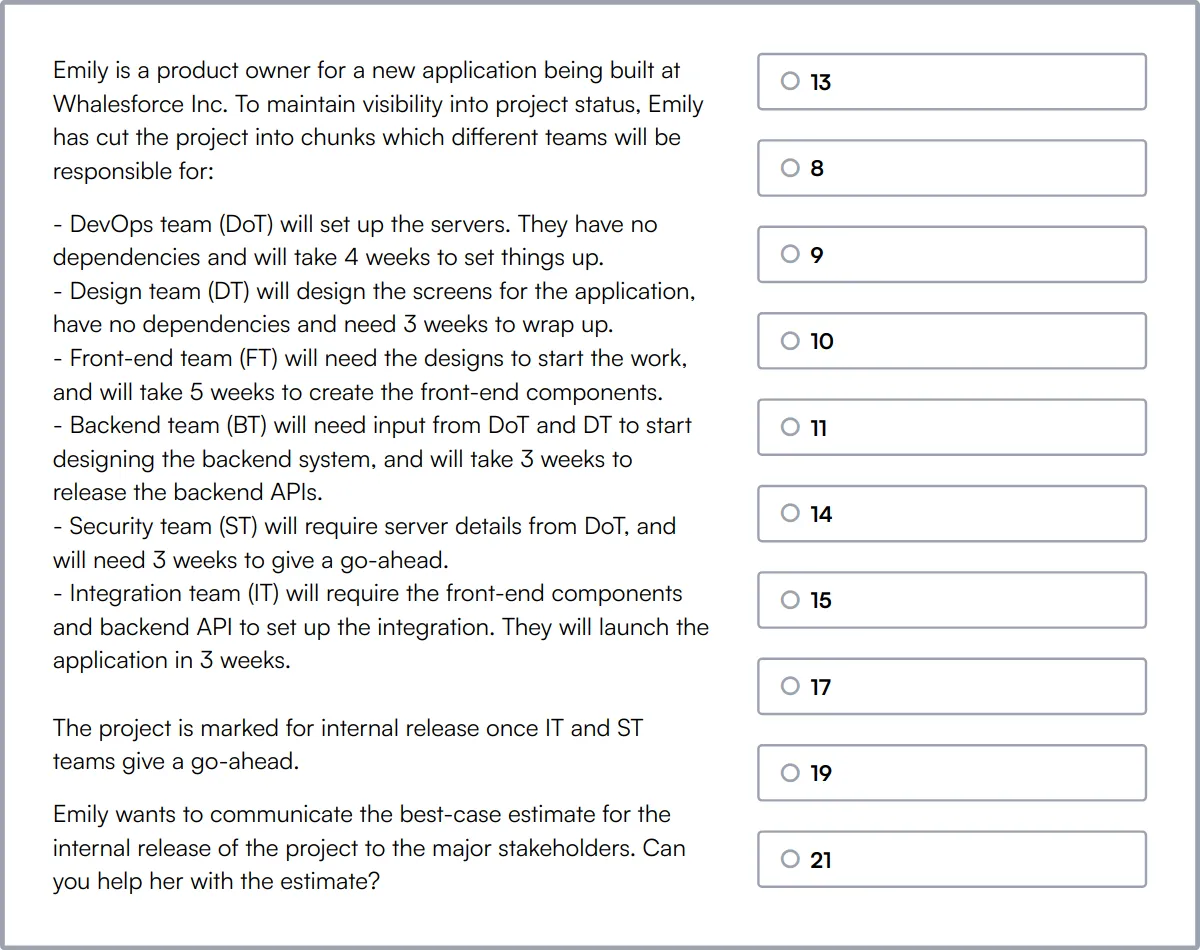
GDPR Online Test
GDPR Online Test uses scenario-based MCQs to evaluate candidates on their understanding of GDPR regulations and best practices for data protection and privacy.
The test assesses skills in data privacy, data protection, data security, data breach management, data processing, and consent management. Candidates must demonstrate their ability to identify and evaluate data protection risks and develop GDPR compliance policies.
High-scoring candidates show a strong understanding of GDPR requirements and the ability to ensure the security and privacy of personal data.
Data Analysis Test
Data Analysis Test assesses a candidate's ability to handle, modify, analyze, and interpret data using scenario-based MCQ questions.
The test covers data modeling, data analysis, business analysis fundamentals, data interpretation, data queries and databases (SQL), and data visualization. Candidates must demonstrate their ability to analyze data to find possible outcomes, detect anomalies, and extract meaningful insights.
Successful candidates show proficiency in using popular data tools like Excel and SQL to manipulate and visualize data effectively.

Summary: The 7 key COO skills and how to test for them
| COO skill | How to assess them |
|---|---|
| 1. Strategic Planning | Evaluate the ability to develop and implement long-term business strategies. |
| 2. Financial Acumen | Assess understanding of financial statements and budgeting processes. |
| 3. Operations Management | Check skills in streamlining processes and improving operational efficiency. |
| 4. Change Management | Gauge capability to lead and manage organizational change initiatives. |
| 5. Risk Management | Determine proficiency in identifying and mitigating business risks. |
| 6. Data Analysis | Measure ability to interpret data and make data-driven decisions. |
| 7. Stakeholder Communication | Evaluate effectiveness in communicating with internal and external stakeholders. |
Oracle OAF Test
COO skills FAQs
What is the importance of strategic planning in a COO role?
Strategic planning helps COOs align operations with the company's long-term goals. It ensures resources are allocated effectively and helps in anticipating future challenges.
How can financial acumen be assessed in a COO candidate?
Evaluate their experience with budgeting, financial forecasting, and cost management. Ask for examples of how they have improved financial performance in previous roles.
What are key indicators of strong operations management skills?
Look for experience in streamlining processes, improving efficiency, and managing large teams. Ask about specific projects where they optimized operations.
Why is change management important for a COO?
Change management ensures smooth transitions during organizational changes. It minimizes disruptions and helps maintain productivity and morale.
How do you assess a COO's risk management capabilities?
Inquire about their experience with identifying, assessing, and mitigating risks. Ask for examples of how they handled crises or potential threats.
What role does data analysis play in a COO's responsibilities?
Data analysis helps COOs make informed decisions. It involves interpreting data to identify trends, measure performance, and guide strategic initiatives.
How important is stakeholder communication for a COO?
Effective communication with stakeholders ensures alignment and support for initiatives. It involves clear, concise, and transparent communication strategies.
What should you look for in a COO's project management skills?
Assess their ability to plan, execute, and close projects. Look for experience with project management tools and methodologies, and ask about successful projects they led.

40 min skill tests.
No trick questions.
Accurate shortlisting.
We make it easy for you to find the best candidates in your pipeline with a 40 min skills test.
Try for freeRelated posts
Free resources



